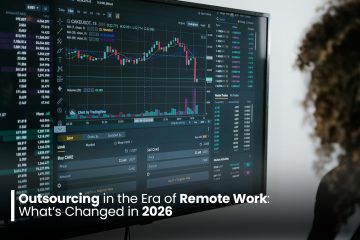If you’ve noticed the buzz lately, you can see how fast e-commerce is evolving and to be honest, it’s not slowing down anytime soon. According to ecommercetips.org, global online retail sales are expected to hit a jaw dropping $8.1 trillion by 2026. Here’s the thing as sales skyrocket, so do financial headaches.
Running an online store sounds great, products flying off the shelves, ads that actually convert, customers raving about your brand. Behind every order notification lies a messy trail of numbers, taxes, inventory counts and bank reconciliations. That’s the part no one puts on Instagram.
This is where the outsourcing of accounting steps in. It’s not just a cost saving hack, it’s the modern entrepreneur’s cheat code to sanity. Today, we’re going to pull back the curtain on why more e-commerce founders are outsourcing their accounting, how it actually works and why it might just be the smartest business decision you make this year.
Why E-commerce Accounting is a Different Beast
Here’s the thing, e-commerce accounting is not your traditional bookkeeping game. It’s more like managing fire sticks while riding a unicycle. Sure, anyone can track expenses in Excel at first but the moment you start selling across platforms like Shopify, Amazon and WooCommerce, things get messy fast.
As bookkeep.com points out, founders often underestimate this complexity until they’re knee deep in reconciliations and tax filings. Without the right system, errors aren’t just possible, they’re inevitable. Some of the unique struggles include:
- Multi channel sales – Reconciling numbers from multiple platforms without pulling your hair out.
- Inventory chaos – Keeping track of products across warehouses and marketplaces.
- Cross border taxes – VAT in Europe, sales tax in the U.S, GST elsewhere, every region wants its cut.
- Payment gateways – PayPal, Stripe and Afterpay all with different fees and settlement timelines.
The Case for Outsourcing Accounting
So why exactly are entrepreneurs leaning into accounting outsourcing? Because it’s not just about trimming costs, it’s about flipping the script on how you manage your business. Think of it as swapping a heavy backpack for a rocket pack, you suddenly move faster and with way less effort.
As Outsource Accelerator highlights, businesses that outsource often enjoy not just lower costs but clearer compliance and financial confidence. Here’s what outsourcing unlocks for e-commerce:
- Cost Savings – With accounting services for small businesses, you’re not paying full time salaries, benefits and office overhead. You just pay for what you need.
- Expertise on tap – Outsourced teams live and breathe e-commerce accounting, from handling multi currency transactions to staying ahead on tax regulations.
- Scalability – If your store explodes in growth? No problem. Outsourced accounting teams scale with you.
- Technology access – Tools like Xero, QuickBooks and NetSuite come baked in without you footing the bill.
- Time back in your pocket – Instead of drowning in spreadsheets, you can focus on marketing, customer engagement and growth.
- Regulatory compliance – No more guessing games with sales tax and VAT. Experts keep you compliant.
- 24/7 support – With global outsourcing firms, help is just a message away, regardless of your time zone.
What Services Can You Outsource?
If you’re picturing outsourcing as just “someone else balancing my books,” think bigger. Modern accounting services for small businesses are practically an extension of your operations team.
- Bookkeeping – Let’s start with the basics, keeping track of your daily sales, expenses and bank reconciliations so your numbers always add up without stress.
- Inventory Management – Here’s where things get tricky, syncing your stock across Amazon, Shopify and eBay to avoid the dreaded overselling or stockouts.
- Tax Compliance – And let’s be honest, taxes can be a nightmare, sales tax, VAT, GST all handled smoothly, without the last-minute panic attacks.
- Financial Reporting – This is where clarity comes in with monthly statements, cash flow updates and forecasts that actually make sense for your business.
- Accounts Payable/Receivable – Think of it as a balance in action, making sure your customers pay you on time and your vendors stay happy too.
- Payroll – Finally, the people’s side of things, free payments for your employees and contractors, every single time.
And if you think this is just a theory, consider a Clutch survey that found that 37% of small businesses are already outsourcing accounting. So it’s not just for the big players anymore.
How to Choose the Right Outsourcing Partner
Outsourcing isn’t just about dumping your numbers on someone else, it’s about finding a partner who “gets” your business. Remember the cheapest option isn’t always the smartest. A good partner prevents costly errors that would dwarf any upfront savings. If you’re looking at providers for e-commerce accounting, here’s what to prioritize:
- Proven e-commerce experience – Ask if they’ve worked with online sellers before.
- Tech compatibility – They should integrate seamlessly with your platforms.
- Data security – Accounting deals with sensitive information and asks about encryption and compliance.
- Transparent pricing – No one likes hidden fees.
- Communication – They should feel like part of your team, not a distant vendor.
Common Mistakes to Avoid
Even with outsourcing, a few rookie mistakes can sneak in. These may sound small but they can snowball into massive headaches and fines. Some to watch for:
- Mixing personal and business accounts.
- Skipping monthly reconciliations.
- Overlooking sales tax obligations across states or countries.
- Ignoring multi currency tracking when selling globally.
- Choosing partners solely based on cost over quality.
The Future of Outsourced E-commerce Accounting
Here’s where it gets exciting. With the e-commerce market expanding at breakneck speed, outsourcing of accounting is evolving from just a service into a strategic partnership.
Firms are already leaning on AI-driven automation, predictive analytics and real time dashboards to give entrepreneurs deeper insights. As prnewswire.com points out, delegating noncore tasks like accounting frees businesses to focus on innovation and customer experience.
This means outsourcing in 2025 and beyond won’t just be about balancing books, it’ll be about fueling smarter decisions, spotting trends early and giving e-commerce founders a real competitive edge.
Conclusion
Let’s be real, running an online store is hard enough without also being your own accountant. e-commerce accounting is complex, messy and often overwhelming. However, with the right accounting services for small businesses, you don’t have to carry that burden alone.
Accounting outsourcing gives you clarity, saves you time and positions your business for growth. Well, it’s less about cutting costs and rather more about leveling up your strategy.
So, keep in mind the next time you find yourself staring at a pile of receipts or panicking about tax deadlines, remember you don’t have to go it all alone. The future of e-commerce is outsourced, automated and way less stressful. That’s a complete guide worth bookmarking.



0 Comments